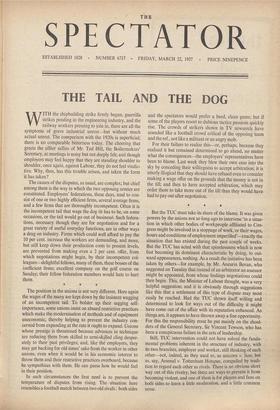THE TAIL AND THE DOG
WITH the shipbuilding strike firmly begun, guerrilla strikes pending in the engineering industry, and the railway workers pressing to join in, there are all the symptoms of grave industrial unrest—but without much actual unrest. The comparison with the 1920s is superficial; there is no comparable bitterness today. The cheering that greets the sillier sallies of Mr. Ted Hill, the Boilermakers' Secretary, at meetings is noisy but not deeply felt; and though employers may feel happy that they are standing shoulder to shoulder, once again, against Labour, they do not feel vindic- tive. Why, then, has this trouble arisen, and taken the form ' it has taken?
The causes of the disputes, as usual, are complex; but chief among them is the way in which the two opposing armies are constituted. Employers' federations, these days, tend to con- sist of one or two highly efficient firms, several average firms, and a few firms that are thoroughly incompetent. Often it is the incompetent tail that wags the dog (it has to be, on some occasions, or the tail would go out of business). Such federa- tions, necessary though they are for negotiation and for a great variety of useful everyday functions, are in other ways a drag on industry. Firms which could well afford to pay the 10 per cent. increase the workers are demanding, and more, but still keep down their production costs to present levels, are prevented from making even a 2 per cent. offer, from which negotiations might begin, by their incompetent col- leagues—delightful fellows, many of them, these bosses of the inefficient firms; excellent company on the golf course on Sunday; their fellow federation members would hate to hurt
them. ,
* * * .
The position in the unions is not very different. Here again the wages of the many are kept down by the insistent wagging of an incompetent tail. To bolster up their sagging self- importance, some unions insist on absurd restrictive practices which make the modernisation of methods and of equipment uneconomic, thereby helping to prevent the industry con- cerned from expanding at the rate it ought to expand. Unions whose prestige is threatened because advances in technique are reducing them from skilled to semi-skilled .cling desper- ately to their past privileges; and, like the employers, they may get backing for old times' sake from the worker in other unions, even when it would be in his economic interest to throw them and their restrictive practices overboard, because he sympathises with them. He can guess how he would feel in their position.
In such circumstances the first need is to prevent the temperature of disputes from rising. The situation here resembles a football match between two old rivals : both sides and the spectators would prefer a hard, clean game; but if some of the players resort to dubious tactics passions quickly rise. The crowds of strikers shown in TV newsreels have sounded like a football crowd critical of the opposing team and the ref., not like a militant or an angry mob.
For their failure to realise this—or, perhaps, because they realised it but remained determined to go ahead, no matter what the consequences—the employers' representatives have been to blame. Last week they blew. their own case into the sky by conceding their willingness to accept arbitration; it is utterly illogical that they should have refused even to consider making a wage offer on the grounds that the money is not in the till; and then to have .accepted arbitration, which may order them to take more out of the till than they would have had to pay out after negotiation.
* *
But the TUC must take its share of the blame. It was given powers by the unions not so long ago to intervene 'in a situa- tion in which other bodies of workpeople affiliated to Con- gress might be involved in a stoppage of work, or their wages, hours and conditions of employment imperilled'—exactly the situation that has existed during the past couple of weeks. But the TUC has acted with that spinelessness which is now fast becoming its dominant characteristic by doing, to out- ward appearances, nothing. As a result the initiative has been taken by others—for example, by Mr. Aneurin Bevan, who suggested on Tuesday that instead of an arbitrator an assessor might be appointed, from whose findings negotiations could then begin. This, the Minister of Labour thought, was a very helpful suggestion; and it is obviously through suggestions like this that a settlement of this type of dispute may most easily be reached. Had the TUC shown itself willing and determined to look for ways out of the difficulty it might have come out of the affair with its reputation enhanced. As things are, it appears to have thrown away a fine opportunity. For this the responsibility must be put mainly on the shoul- ders of the General Secretary, Sir Vincent Tewson, who has been a conspicuous failure in the arts of leadership.
Still, TUC intervention could not have solved the funda- mental problems inherent in the structure of industry, with its two branches, employer and worker, still thinking of each other—not, indeed, as they used to, as unicorn v. lion; but
as, say, Arsenal v. Tottenham Hotspur, compelled by tradi- tion to regard each other as rivals. There is no obvious short way out of this rivalry; but there are ways to prevent it from
becoming violent, and one of them is for players and fans on both sides to learn a little moderation, and a little common sense.


































 Previous page
Previous page